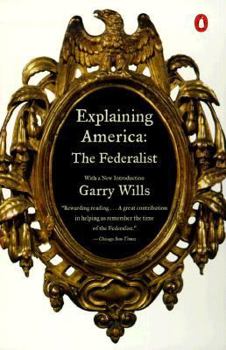Explaining America: The Federalist
Select Format
Select Condition 
Book Overview
Now with a new introduction--award-winning historian Garry Wills's definitive analysis of the Federalist Papers In 1787 and 1788, Alexander Hamilton and James Madison published what remains perhaps... This description may be from another edition of this product.
Format:Paperback
Language:English
ISBN:0140298398
ISBN13:9780140298390
Release Date:April 2001
Publisher:Penguin Books
Length:320 Pages
Weight:1.35 lbs.
Dimensions:7.8" x 0.7" x 5.0"
Customer Reviews
1 rating
Civics you probably didn't get in high school
Published by Thriftbooks.com User , 20 years ago
Garry Wills' Explaining America - The Federalist (1982) presents civics as I never learned it in high school. Wills is probably better known for more recent books (e.g. Lincoln at Gettysburg), or his coverage of the 1988 Presidential campaign. There is substance here - a detailed consideration of the context in which Alexander Hamilton and James Madison wrote The Federalist Papers, and their understanding of how the government would work under the Constitution. [Some of this conceptual framework was re-presented in A Necessary Evil.] The preface identifies this to be volume 2 of a 4-book series on the foundations of the U.S. government. I have been unable to locate the promised volumes 3 & 4, on the Constitution itself, and on the Supreme Court.Wills opens with an exposition of Hamilton's & Madison's similarities & differences. He then focuses on two specific papers (of 85): Number 10, "Representation", and Number 51 "Checks and Balances". He elucidates the Scottish Enlightenment as the source of many of the most important ideas, such as separation of powers, checks and balances, and public virtue. Most interesting are the explanations that the authors of the Constitution gave as to how they expected it to work, which is not at all how it has worked out: representatives would exhibit public virtue (meaning that they would place the interest of the whole above the factional or party interest) because of distillation; political parties would not exist because they would be unnecessary; the primary (in fact, only) check on legislative tyranny would be the bicameral arrangement; the executive and judicial branches would be weak and relatively unable to resist legislative dominance. Unfortunately, the book is not as accessible as Wills' more recent works (wordy with obscure details in spots). Perhaps this is due in part to comparative familiarity. Most of us have never really spent a lot of time on Constitutional law, nor read much of the original writings of the founding fathers, nor their intellectual forebears, such as Hume & Locke. But for purposes of understanding the founders' original intent, its applicability in today's world, this book provides significant insight. It is valuable precisely for the reason that we are unfamiliar with how & why the Constitution structured our government as it is.Having enjoyed the fruits of our Federal Republic for over two centuries, we may be lulled into taking it for granted. Conversely, viewing a world abounding with tyrannies, dysfunctional nations, and failed states, we might look to the founders of the U.S. government for wisdom. Here we find that they struggled to integrate widely varied visions and concepts, compromised extensively, and produced a government that succeeded beyond their expectations for reasons fundamentally at odds from their understanding. Perhaps the only shortcoming of this book is that this crucial topic - success for reasons differing from the founding fathers' understandin





